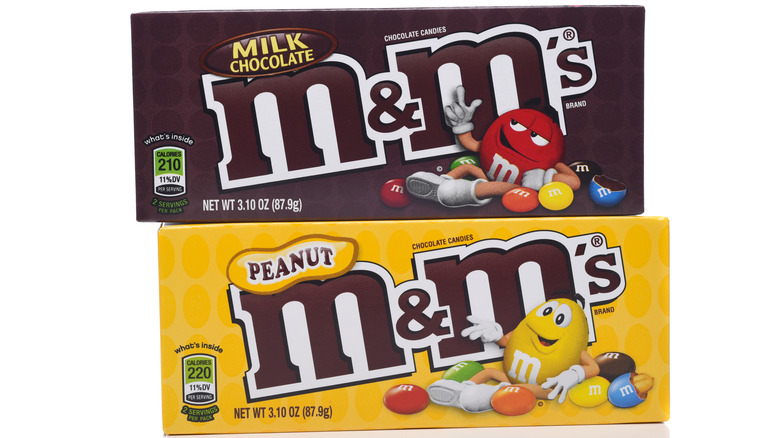How The Military Played A Role In M&M's Early Days
Americans have been eating M&M's since 1941, when Forrest E. Mars, Sr., introduced them, according to the M&M's' history page. The candies have come a long way since then, with the addition of several other flavors. Peanut M&M's launched in 1954, followed by M&M's Peanut Butter Chocolate Candies in 1989 and M&M'S Caramel Candies in 2017.
Everyone who's had them knows they come in various colors and "melt in your mouth, not in your hand," but what many people don't know is the history behind this bite-sized candy. And that "melts in your mouth" slogan? There was a specific reason the candy was made that way, and it wasn't to compete with other candies. It actually involved the military during World War II, as History explains.
Although there were some unfortunate events that preceded the creation of M&M's candy, if it weren't for those events, the colorful candy might not exist today.
Another candy in England inspired the creation of M&M's
In the early 1930s, Forrest and his father, Frank, who was also his business partner, had a disagreement and decided to go their separate ways, according to History. Forrest moved to England in 1932. While there, he saw some British soldiers eating "small chocolate beads encased in a hard sugar shell" during the Spanish Civil War. This edible shell prevented the chocolate from melting, which inspired Forrest to duplicate the concept with his own products.
The New York Times claims he returned to the United States during World War II. In 1941, he established M&M's Limited in Newark, New Jersey, and introduced M&M's Plain Chocolate Candies (via M&M's) with his own version of a hard shell that didn't melt. History states that the new, heat-resistant candy was sold exclusively to the U.S. military, but by the 1950s, millions of civilians were also enjoying the candy, according to M&M's' history page.
Unfortunately, Frank didn't live long enough to enjoy his son's M&M's creation. According to the Candy Hall of Fame, he passed away in 1933. It's unclear if they ever reconciled, but if they hadn't got into a squabble in the first place, Forrest may not have ever moved to England. If he never moved to England, he wouldn't have seen soldiers eating chocolate candies encased in hard shells. And if he had never seen those candies, he may not have ever thought to create M&M's.

